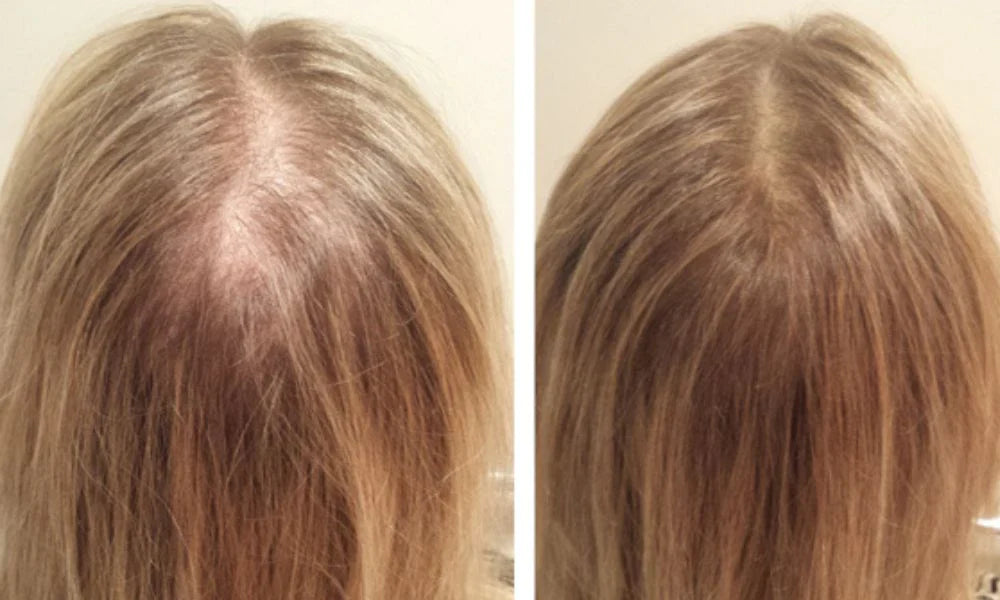Clinically Backed Supplements That Actually Work (For Hair Loss)

The Best Clinically-Backed Supplements for Hair Loss

Image Credit @Allure
Hair loss is a significant concern for many people, with millions worldwide experiencing thinning hair or baldness at some point in their lives. While there are various treatments available, including medications, topical treatments, and hair restoration procedures, some people opt to try supplements to promote healthy hair growth. I am one of those people, I easily incorporate them with my morning green tea ritual but you can take them any way and some like zinc preferably with food! In this article, we'll discuss the best clinically-backed supplements for hair loss that have been shown to be effective in scientific studies.
1. Biotin
Biotin, also known as vitamin B7, is a water-soluble vitamin that plays a crucial role in healthy hair growth. Biotin helps convert nutrients in food into energy that the body can use, and it also helps strengthen hair and nails.
A randomized, placebo-controlled trial published in the Journal of Clinical and Aesthetic Dermatology found that biotin supplementation improved hair growth and reduced hair shedding in women with self-perceived thinning hair. Another study published in the International Journal of Trichology found that biotin supplementation improved hair growth in patients with alopecia.
2. Iron
Iron is an essential mineral that helps transport oxygen to cells throughout the body, including hair follicles. Iron deficiency can lead to hair loss, as the body prioritizes oxygen transport to other vital organs.
A study published in the Journal of Korean Medical Science found that iron supplementation improved hair loss and hair growth in women with iron deficiency anemia. Another study published in the Journal of Dermatology found that iron supplementation improved hair growth in women with female pattern hair loss.
3. Zinc
Zinc is a trace mineral that plays a vital role in healthy hair growth, as it helps the body produce new cells and tissues. Zinc also helps regulate hormone levels, which can impact hair growth. It's readily available, relatively inexpensive with not many restrictions on use.
Proof: A randomized, double-blind, placebo-controlled trial published in the Annals of Dermatology found that zinc supplementation improved hair growth and reduced hair loss in patients with alopecia areata. Another study published in the International Journal of Trichology found that zinc supplementation improved hair density and thickness in patients with telogen effluvium.
4. Vitamin D
Vitamin D is a fat-soluble vitamin that helps the body absorb calcium and maintain healthy bones. However, research has also linked vitamin D deficiency to hair loss.
Proof: A randomized, double-blind, placebo-controlled trial published in the Skin Pharmacology and Physiology Journal found that vitamin D supplementation improved hair growth in women with female pattern hair loss. Another study published in the Journal of Cosmetic Dermatology found that vitamin D supplementation improved hair density and reduced hair loss in patients with telogen effluvium.
5. Saw Palmetto
Saw palmetto is an herbal supplement derived from the fruit of the Serenoa repens plant. It is often used to treat enlarged prostate and has also been shown to help promote healthy hair growth.
Proof: A randomized, double-blind, placebo-controlled trial published in the Journal of Alternative and Complementary Medicine found that saw palmetto supplementation improved hair growth and reduced hair loss in men with male pattern baldness. Another study published in the Journal of Cutaneous and Aesthetic Surgery found that saw palmetto supplementation improved hair growth in women with female pattern hair loss.
6. Niacin
Niacin, also known as vitamin B3, is a water-soluble vitamin that helps the body convert food into energy. It also plays a role in promoting healthy skin, hair, and nails. Niacin helps increase blood flow to the scalp, which can promote hair growth.
Proof: A randomized, double-blind, placebo-controlled trial published in the Journal of Cosmetic Dermatology found that niacin supplementation improved hair density and reduced hair loss in women with female pattern hair loss.
7. Omega-3 Fatty Acids
Omega-3 fatty acids are essential fats that the body cannot produce on its own and must obtain through the diet. They are important for maintaining healthy hair, as they help nourish hair follicles and support scalp health.
Proof: A study published in the Journal of Cosmetic Dermatology found that omega-3 supplementation improved hair density and thickness in women with female pattern hair loss.
8. Collagen
Collagen is a protein that provides structure and support to the body's tissues, including the skin and hair. As we age, collagen production decreases, which can lead to thinning hair and brittle nails.
A randomized, placebo-controlled trial published in the Journal of Drugs in Dermatology found that collagen supplementation improved hair thickness and scalp coverage in women with thinning hair.
9. Probiotics
Probiotics are beneficial bacteria that help promote a healthy gut microbiome. They have also been shown to support healthy hair growth by helping the body absorb essential nutrients and reducing inflammation.
Proof: A study published in the International Journal of Women's Dermatology found that probiotic supplementation improved hair growth and thickness in women with female pattern hair loss.
10. Curcumin
Curcumin is a compound found in turmeric that has anti-inflammatory and antioxidant properties. It has been shown to promote healthy hair growth by reducing inflammation and oxidative stress.
Proof: A randomized, double-blind, placebo-controlled trial published in the Journal of Cosmetic Dermatology found that curcumin supplementation improved hair growth and thickness in patients with androgenetic alopecia.
While these supplements have shown promise in promoting healthy hair growth, it's important to note that they may not work for everyone. It's best to consult with a healthcare provider before starting any new supplement regimen. Additionally, it's important to remember that supplements are not a substitute for a healthy diet and lifestyle.
References:
- Almohanna, H. M., Ahmed, A. A., Tsatalis, J. P., & Tosti, A. (2019). The Role of Vitamins and Minerals in Hair Loss: A Review. Dermatology and therapy, 9(1), 51–70. https://doi.org/10.1007/s13555-018-0278-6
- Beoy LA, Woei WJ, Hay YK. Effects of tocotrienol supplementation on hair growth in human volunteers. Trop Life Sci Res. 2010;21(2):91-99.
- Glynis A. A Double-blind, Placebo-controlled Study Evaluating the Efficacy of an Oral Supplement in Women with Self-perceived Thinning Hair. Journal of Clinical and Aesthetic Dermatology. 2012;5(11):28-34.
- Kim DH, Lee JW, Kim DI, Lee SJ, Hwang JH, Kim JY. A Study of Iron Supplementation Effect on Hair Growth in Korean Women with Iron Deficiency. J Korean Med Sci. 2017;32

